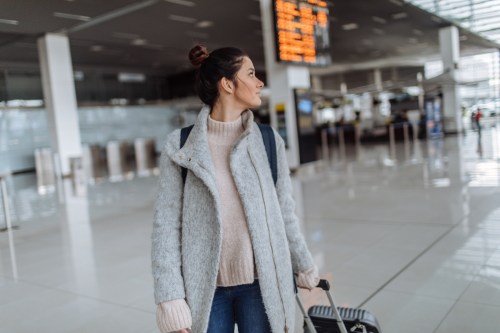What you should eat before a flight to avoid traveler’s constipation
A registered dietitian gives tips on what to eat before heading to the airport to avoid traveler's constipation, and what to sip on your flight.

Holiday travel is stressful enough without having your G.I. tract turn against you (unless you want to hide out in the bathroom while visiting your relatives). But traveler’s constipation is real and can happen anytime you’re outside your normal routine. Time differences, not drinking enough water, and eating processed foods from an airport kiosk all mess with your digestion.
One step you can do to prevent traveler’s constipation, according to Seattle-based registered dietitian Ginger Hultin, RD is starting your day out with a few digestive keys that will work in your favor. While you can’t control what you will and won’t have access to once you hit the road, the hour before you leave for the airport is your time to set your body up for success.
What you should eat to avoid traveler’s constipation
1. oatmeal
“A powerhouse way to start the day, oats are versatile, delicious, and great for the gut,” Hultin says. (If you think oatmeal is boring, these recipes will prove you wrong.) The reason, Hultin says, oatmeal can help prevent constipation is because it’s full of fiber. “Oats contain both soluble and insoluble fiber, which keeps things moving through the gut even when you’re traveling she says.” To increase the fiber content, add nuts, seeds, and berries.
2. chia seeds
Whether you add a serving of chia seeds to your oatmeal or opt to add them into a smoothie or even on top of eggs, they’re another food Hultin recommends to avoid traveler’s constipation. “One of the highest fiber foods you can eat at breakfast—or any time of the day—chia seeds can easily be tossed into granola, cereal, a smoothie, or made into a pudding to grab-and-go,” she says, adding that they also are good sources of protein and omega-3 fatty acids. If you don’t have time to eat before your flight, bring chia seeds with you to add into yogurt you can buy at the airport.
3. Black or green tea
Hultin says hot caffeinated tea is helpful because it’s hydrating and kickstarts digestion. “Consider starting your day with a black or green tea for hydration, antioxidants, and helping you stay regular when traveling,” she says. It’s something you can even buy at the airport to sip while in the air, supporting your digestive tract while you reach your destination.
The key to avoiding traveler’s constipation is to be extra conscious of your fiber intake since you likely don’t have access to your usual go-to sources. And if you’re still feeling a bit backed up, sip on a nice hot cup of tea. With these tips in mind you can focus on your trip—and not on the bathroom.
A dietitians guide to gut health:
Here’s some more tips on how to stay healthy while traveling, including some stretches you can do while on the plane.
Sign Up for Our Daily Newsletter
Get all the latest in wellness, trends, food, fitness, beauty, and more delivered right to your inbox.
Got it, you've been added to our email list.










